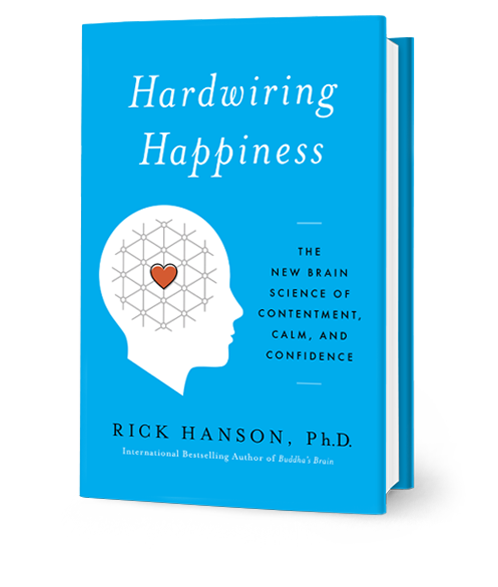RESOURCES TO GROW INNER STRENGTHS FOR
Depression and Sadness
Experiencing sadness or disappointment is normal even in the best circumstances.
But depression is a sign that something’s gone wrong. When our emotional pain turns to long-term suffering, it’s time to seek help.
There are sensible things we can to to reduce depressive experiences. We can move from being a “depressed person” to someone who sometimes has depression.
FREE VIDEOS
How to Overcome Depression, Manage Sadness, and Recover From Grief
FREE READS
Simple Practices for Overcoming Depression and Sadness
Being Well Podcast Episodes
Living with Depression
Rick discusses being aware, stepping back and looking at the body sensations and cognitive elements of depression, so one can begin to disengage from it.
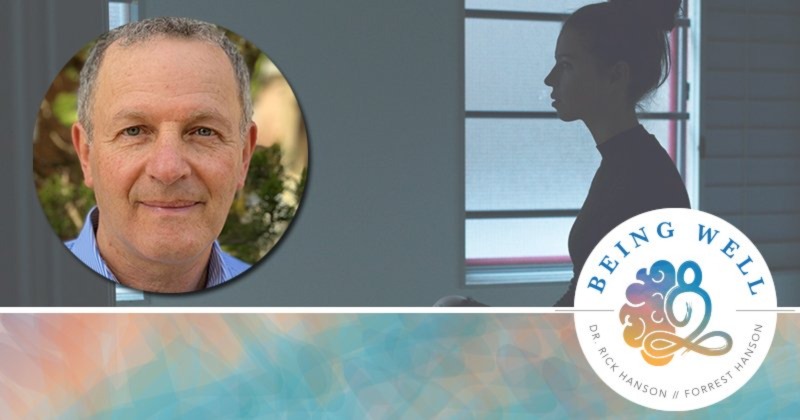
Being Well Podcast: Mindfulness for Depression with Dr. Zindel Segal
On this episode, Dr. Zindel Segal joins us to talk about Mindfulness-Based Cognitive Therapy (MBCT), an eight-week group therapy program designed to help those who suffer with chronic unhappiness and prevent relapse after episodes of severe clinical depression.
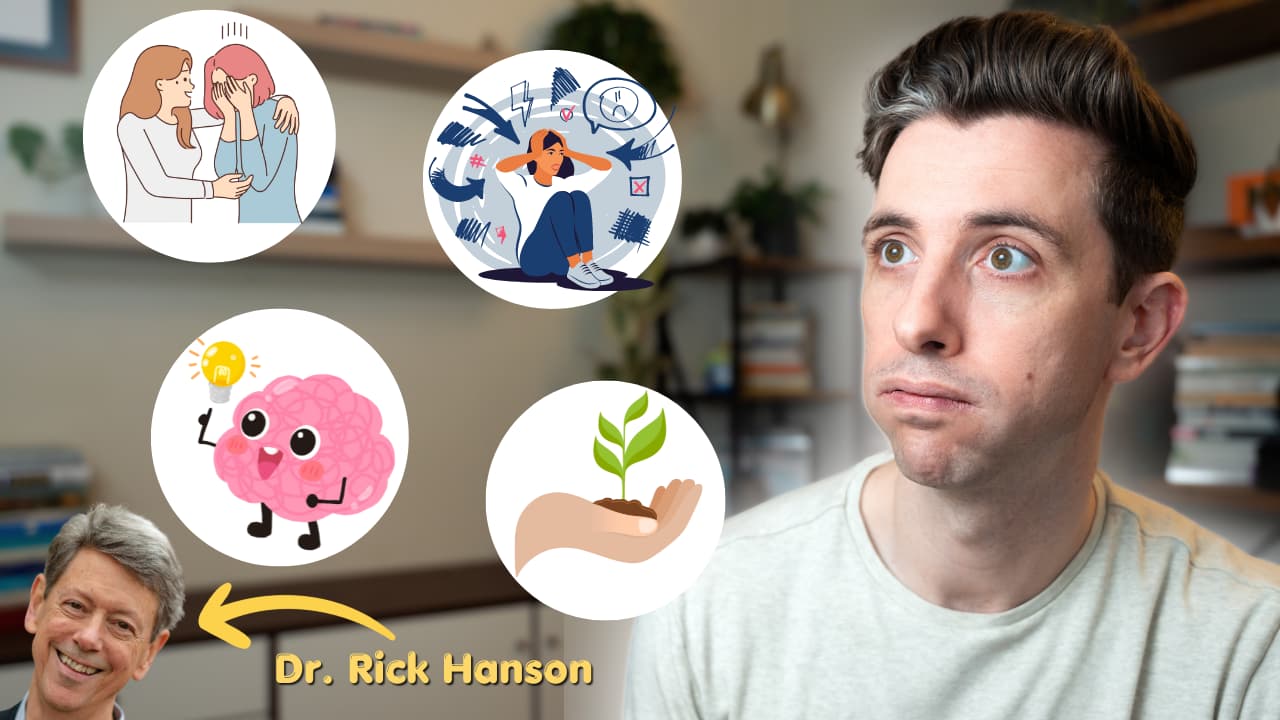
Being Well Podcast: Dealing with a Mental Health Crisis, Trauma and Meditation, and Getting Back on the Wagon: January Mailbag
Forrest and Dr. Rick open up the mailbag to answer questions from listeners. How can we understand and support someone going through a mental health crisis? Is meditation enough to heal trauma? And what can we do about family members that just won’t change?
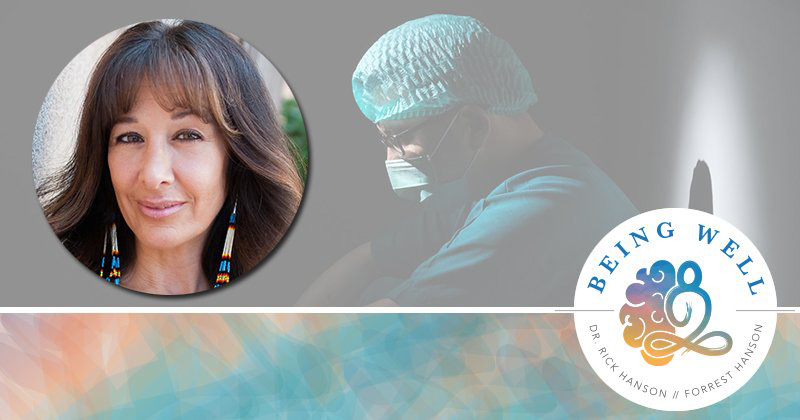
Being Well Podcast: Being with Grief with Dr. Joanne Cacciatore
In this conversation from the Life After COVID Summit, Dr. Joanne Cacciatore joins Forrest to help us put the past in perspective, and relate in healthier and more whole ways to the many things we’ve lost over the past year.
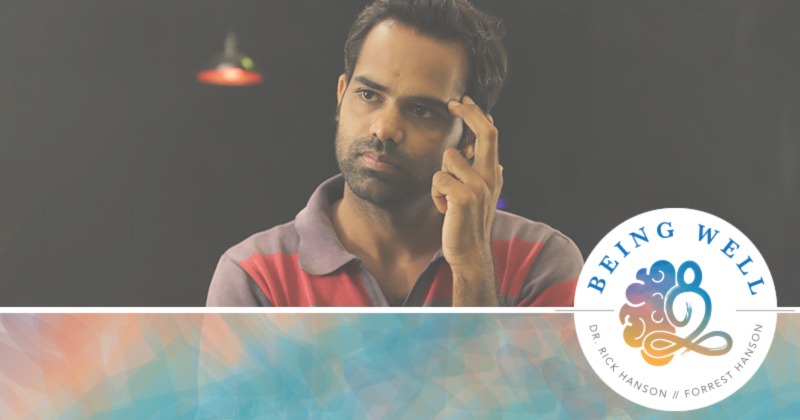
Being Well Podcast: Rumination: How to Disrupt Obsessive Thoughts
Learn what rumination is, where it comes from, and explore practices and strategies to identify rumination when it comes up, and move through it compassionately and effectively.

Being Well Podcast: What to Do When Things End
Life includes many major culminating moments: we finish the big work project, receive the award, watch the kids leave home, go on the vacation, win the title, or enter retirement. These experiences can come with enormous fulfillment…for a while. And then, we might ask ourselves: Now what? In this episode, we explore that question, including how we can relate to the past, integrate learning, turn toward the future, and age well through life.
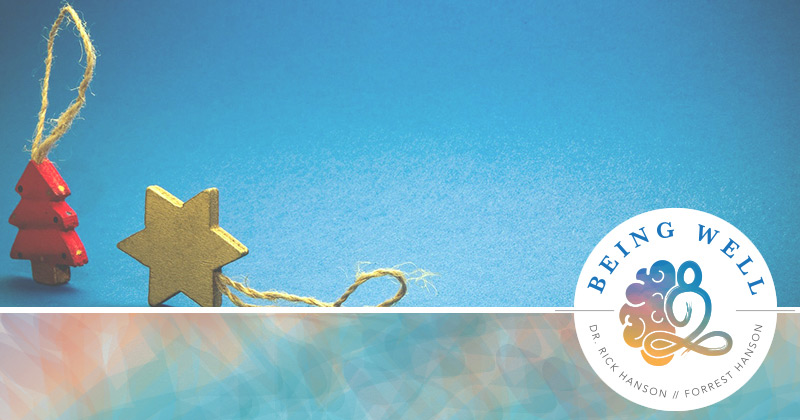
Being Well Podcast: Sadness and Disappointment Around the Holidays
The holidays are coming up, and for many people they’re likely to be very different this year from usual. Experiencing sadness or disappointment around the holidays is normal even among the best circumstances, and we’re far from those. On this episode, Forrest and I explore how to work with this year’s natural feelings of sadness and disappointment.

Being Well Podcast: The Science of Well-Being with Laurie Santos
On this week’s episode, Dr. Laurie Santos joins Forrest and me to share what science says about how we can maintain our well-being during this difficult time.
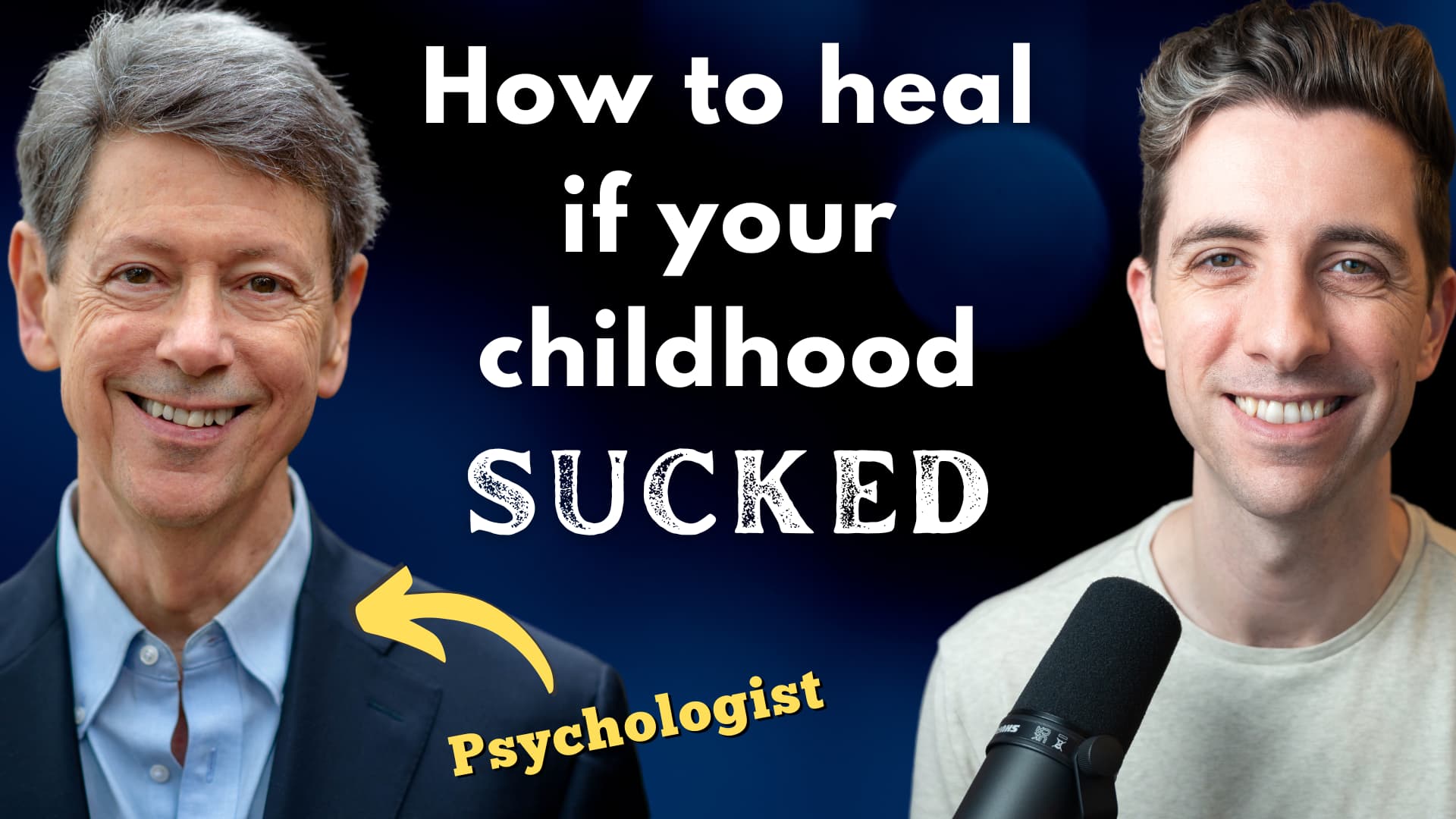
Being Well Podcast: Recovering from a Challenging Childhood
Recovering from a challenging childhood as an adult can be a difficult process, which is what we explore on this episode.
Ways to Manage a Depressed Mood
Practical tips for managing a depressed mood from a recent Being Well Podcast episode.
Online Courses
Grief and Loss
Growing Inner Strengths for Coping, Healing, and Growing
Join Dr. Rick Hanson for a 5-week course with simple, powerful practices that help us bear the unbearable, and in natural ways move forward, heal, and find happiness again.

Frequently Asked Questions
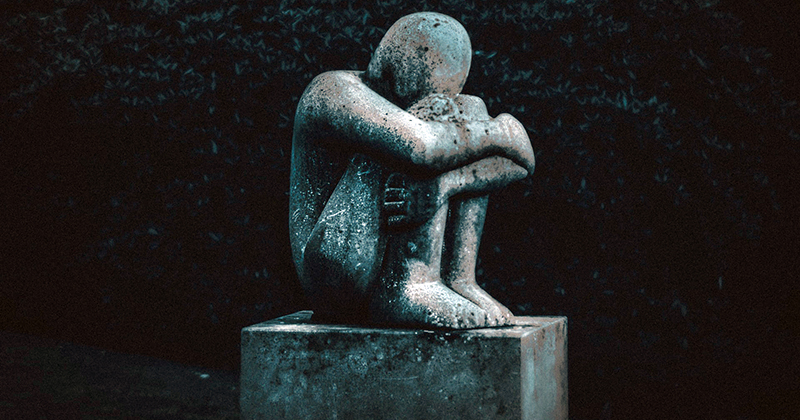
Psychologist and Author Dr. Rick Hanson answers questions about
Depression and Sadness
Can anyone develop a “buddha brain” – even people struggling with mental illness or depression?
Definitely!
First, a “buddha brain” is simply one that knows how to be truly happy in the face of life’s inescapable ups and downs. (I don’t capitalize the word “buddha” here to focus on the original nature of the word – which is “to know, to see clearly” – to distinguish my general meaning from the specific historical individual known as The Buddha.) The possibility of this kind of brain is inherent in the human brain that we all share; any human brain can become a buddha brain. Therefore, a buddha brain is for everyone, whatever their religious orientation (including none at all).
Second, we all must begin the path wherever we are – whether that’s everyday stress and frustration, mental illness, anxiety, sorrow and loss, or depression. In any moment when we step back from our experience and hold it in mindful awareness, or when we begin to let go of negative feelings and factors, or when we gradually turn toward and cultivate positive feelings and factors we are taking a step toward developing a buddha brain. Each small step matters. It was usually lots of small steps that took a person to a bad place, and it will be lots of small steps that take him or her to a better one.
Third, mental anguish or dysfunction can help us grow. They teach us a lot about how the mind works, they can deepen compassion for the troubles and sorrows of others, and, frankly, they can be very motivating. Personally, the times in my life when I have been most intent on taking my own steps toward a buddha brain have been either when I was really feeling blue – and needed to figure out how to get out of the hole I was in – or when I was feeling really good, and could still sense that there had to be more to life than this, and more profound possibilities for awakening.
Will you share some insight on how to deal with grief?
It seems that there are several points to balance:
- Grief has its own organic rhythm, its own waves. We just need to ride them with mindfulness and self-compassion. Over and over. There is no schedule to the end of the waves. After a while they do fade, though. Always.
- Allowing the falling apart can help. Knowing that all eddies disperse, eventually. Knowing that everything has shadows – many terrible things have happened in the past and will happen in the future; not to justify these or be complacent about them, but to regard and feel them with equanimous wisdom. As the 3rd Zen Patriarch wrote: enlightenment is having no anxiety about imperfection.
- Self-compassion is so important.
- Sometimes we just cannot bear the grief, like sometimes we just cannot keep carrying a heavy load. We have to set it down for a while. And instead take a walk in a lovely place, eat some good cookies, take a bubble bath, cuddle with a friend, watch a comedy, pet the cat, read a book, something, anything helpful besides the overwhelming grief. And being a friend to oneself to give oneself these respites and chances for rejuvenation, restoration, replenishment, is vital.
- We need to open to receiving while releasing. To the natural, non-aversive, non-grasping process of receiving fullness – love, gratitude, awe, profundity, the numinous – while experiencing loss (itself a kind of release, a letting go) and all the other losses that come with it.
- Especially important is receiving the love, kindness, compassion, inclusion and friendliness of others.
What are some things that can help when grieving a profound loss?
This is a truly personal experience, so anything I might say is offered modestly.
For me there are three basic ways, and one less basic way, to engage the mind usefully:
- Be with what’s there.
- Decrease what is “negative” (painful or harmful).
- Increase what is “positive” (enjoyable and beneficial).
- Step out of the whole business altogether and into the transcendental.
In other words, let be, let go, let in, let free.
When something very challenging happens, often all we can do is ride out the storm, being with our feelings, experiencing them, letting them flow, while also knowing that what is moving through the mind is part of a vast process with many causes. At some point it feels appropriate to shift more into letting go, trying to release those negative feelings. After that it can become possible to let in, which often resources us enough to go back to a deeper layer of letting be. And all the while, if it’s meaningful, there can be an underlying sense of the transcendental in which mind and matter happen and appear.
I might add that being loving in ways large and small during grieving is like a balm to one’s own heart.
I recently lost my partner, and every time I come across a reference to loving relationships in your book a deep sense of loss stops me in my tracks. How can I move forward, and keep getting value from your work?
- Keep doing your already fruitful practices of taking in the good in general.
- Knowing that you have had a challenge (putting it mildly) to your needs for “connection” (as given in my model in Hardwiring Happiness), look in general for opportunities to internalize experiences of feeling included, seen, appreciated, liked, and loved, without specific reference to your partner.
- Skip over passages in books, or sections of the Foundations of Well-Being program (or similar things) that just retrigger your sense of loss and add little or no value to you. Take it easy on yourself for months and even years to come in this regard.
- Then when the wound of the loss is not so raw and tender, and it is alright for you, you could take in the good of experiences of feeling loved that are more like those you experienced with the person you lost (obviously not replacing them in any way; experiences such as the felt memory of their caring for you, or a loving non-romantic closeness with a partner, or even perhaps when the time comes the feeling that a person you respect is attracted to you). You could also use the Link step of HEAL to hold in awareness at the same time both feelings of being loved today and your sense of grief.
Are there other things I could do to feel better, other than counselling, after losing my job?
It’s obviously normal to be depressed and upset when things are collapsing around a person.
I suggest you talk with your counselor about options that could have more impact for you, from exercise to maybe considering medication. In terms of psychological interventions, I don’t know your situation and I can’t make specific recommendations, but Acceptance and Commitment Therapy comes to mind as something you could look into, just Google it. It’s more or less the Serenity Prayer in action: find your way to peace about what you can’t influence, and do your best each day to influence what you can. You might also find the calming and centering practices in Buddha’s Brain to be helpful.
Do people with a history of recurrent depression have as much capacity for positive change as those who haven’t?
Episodes of depression do tend to sensitize people and make them more prone to depression. To deal with this, MBCT can help prevent relapse; try not to get depressed about feeling depressive. I also think exercise, complexity, stimulation, and visual-spatial tasks are plausible ways to help rehabilitate a hippocampus that’s been through depression, trauma, or both.
Really taking in the good, especially pleasurable social experiences would also be plausible for reducing likelihood of relapse, in part through sensitizing and perhaps increasing oxytocin and opioid receptors in the amygdala and other key regions. Along these lines, focusing on concentration practices that involve the cultivation of bliss/rapture and joy (including happiness, contentment, and tranquility) could help as well.
Alongside all this, even if you are still vulnerable to depression, other inner strengths could still be developed, such as concentration and lovingkindness.
Have hope! I can tell that you are a strong practitioner. And if anti-depressants or related “nutraceuticals” like tryptophan or 5-HTP are helpful for your biochemistry, whatever, it’s skillful means for you and nothing to feel bad about.
Would the Taking in the Good process be applicable with people who have attempted suicide or would you recommend that the client have a certain degree of stability before being able to move into that process?
First, a couple cautions:
- If someone is severely depressed, by definition they are fairly incapable of activating or sustaining an enjoyable experience. As I write in Hardwiring Happiness, with this population I think taking in the good is contraindicated. The one possible exception to this view I offer diffidently: basic experiences of sensual pleasure (e.g., drinking water when thirsty, putting on a sweater when cold, eating a sweet) might be an opportunity to draw attention to a positive experience and – building one second at a time – help the person stay with this experience. This can possibly be a path toward slowly increasing the capacity for enjoyable experiences.
- The “be with it” phase of practice is really important to honor before shifting into the second (reducing, releasing the negative) and third (growing positive qualities – inner strengths – like self-compassion, gratitude, feeling cared about, emotional regulation) phases of practice. Anything I say here about taking in the good with depressed, suicidal, traumatized, grief-stricken, etc. people is in this context.
With this in mind:
- Taking in the good – my shorthand term for activating and installing positive experiences – is implicitly used in many treatments for depression and suicidality, so yes, I do think that doing this more explicitly is appropriate for your population . . . with of course good clinical judgment, and an alert eye to the blocks that routinely arise.
- See if my model of the Avoiding Harms, Approaching Rewards, and Attaching to Others systems is helpful as a way of identifying the key inner strengths that would be good to activate and install in different clients. For example, much suicidality indicates poor inner resources that are loving and encouraging (Attaching system), so developing self-compassion and really looking for opportunities to feel cared about (often in mild yet still real ways) would be relevant “key resource experiences.” Also look for chances to really marinate in reward experiences such as eating a cookie or petting a dog or showering when it’s humid (Approaching system) to build up the sense of life containing enjoyable experiences and reasons to keep on living.
Does Buddhism condemn suicide? Is depression viewed as a weakness in the mind that can be cured through vipassana?
Depression is a mind state like any other, and it possesses the classic three characteristics: it’s impermanent, interdependently arising (and thus empty of absolute self-existence), and generative of suffering if one engages it with craving/clinging (e.g., resists it, gets angry or ashamed for being depressed). Many notable teachers (e.g., Mingyur Rinpoche, Dipa Ma), have a history of depression. It’s the pits for sure. But it’s just another mind state. So deal with it as best you can – “ardent, diligent, resolute, and mindful” – from working on your circumstances to improving your biochemistry to trying to release it (e.g., cognitive methods, imagery, venting) to replacing it with lots of taking in the good. While remembering that you have it, it doesn’t have you. Equanimity is a good thing.
About suicide: I am not aware of any quote from the Buddha himself on the subject. It is clear, though, in the Buddhist meta-model, that we always inherit the results of our actions, for better or worse – in this life, mainly, and in other ones, too. My personal opinion is that killing oneself out of kindness (e.g., euthanasia at the end of life in terminal, hopeless, excruciating pain) is one thing, but killing oneself because of inherently transient conditions such as depression is profoundly unkind to the one person in the universe we have the highest duty to, the one we have the most power over: your future self.
Keep going! Don’t give up. You are an excellent person, and will certainly inherit the good results of your good intentions, good actions, and good heart.
Do you believe that depression can be healed without lifelong medication or do you see it as a chemical imbalance in the brain?
My view and the research evidence is not either/or (meds or no meds). If depressed mood is caused mainly or entirely by a physical health problem (distinct from “imbalance of brain chemistry,” such as an inflammatory condition, poor nutrition leading to significant deficiencies of B vitamins, etc.) or by a life condition (e.g., dreary work, poverty, abusive partner), then changing those causes alone could lift mood.
Assuming that these sorts of causes are not major factors, many people come out of depression with psychosocial interventions alone, ranging from informal ones (more friends, yoga practice, getting a dog, gratitude practice) to more formal ones (e.g., therapy, disputing negative thoughts routinely).
But for some people, psychosocial interventions alone are not enough; they also need to engage neurochemistry directly, taking steps ranging from supplementing tryptophan (perhaps as 5-HTP) to taking Zoloft. Of course, the side effects of medications need to be acknowledged: roughly a third or more of the people taking them find them ineffective or intolerable or both.
A common finding in research studies is that for moderate to severe depression, a combination of both psychosocial and medication interventions has the most benefit for many people. Psychosocial interventions have commonly the added benefit of reducing relapse into depression plus good “side effects” (e.g., feeling like you were the active agent of your own improved mood).
We also need to take into account what a person will actually do; for better or worse, it’s a fact that many people will not engage psychosocial interventions in a sustained way but they will take a pill each day.
Personally, I’m pragmatic and try not to get moralistic or dogmatic about any particular category of intervention.
Bottom-line, we are fundamentally a mind-body process, immaterial consciousness interdependently arising with material neurobiology – and I’ve found both mental and physical interventions to be very useful.
What’s going on in our brains in the experience of depression?
Depression affects both (1) the experiences we have and (2) our capacity to learn/grow/heal from them. So the practical implications are:
- Do sensible things to reduce depressive experiences, such as mental training (e.g., therapy, meditation, the Foundations of Well-being program), and physiological interventions (e.g., exercise, talking with licensed health professionals about the possibility of taking supplements such as 5-hydroxytryptophan or trying medication), and social support (really important!).
- When feeling depressed, let the experience be while also: observing its dynamic, changing, impermanent, “insubstantial” nature; and looking for what is also happening in your stream of consciousness, such as feeling loved or noticing something that is beautiful or pleasurable. In other words, don’t fight the depressive feelings, but don’t get drowned in them.
- When taking in positive experiences, compensate for the effects of depression on your brain’s capacity to change from positive experiences (#2 above) by focusing on and emphasizing their aspects of reward, surprise, delight, and embodied and active movement. This will help them “sink in” more.
- In general, to deal with #2 (above), get lots of exercise and have lots of complex and stimulating activities (this will help your hippocampus). Also try to include play in our list of activities (this will help your “neurotrophic factors”). These things should increase your brain’s neuroplastic response to your experiences, so it is more readily changeable for the better.
- Meanwhile, be someone who sometimes has depression, rather than being a “depressed person.” You are vast, you are fundamentally free!
Will you speak to the process of dealing with a relationship loss?
It is natural for the mind to revisit again and again material related to a loss (e.g., images, longings, thoughts, I-wish-I’d-said). That’s part of the normal grieving process. In meditation and in general, what’s usually wise is to allow the material to be there, take some seconds or minutes to know it for what it is, hold it in a larger space of awareness and interest, and try not to identify with it as “me” or “mine”: it is there in the mind but it is content like any other, such as a sound, sensation, memory, etc. And also for sure bring gentle compassion and kindness to yourself.
In addition to this fundamental mindfulness approach, it can also often be helpful to gently but actively let the loss-related material go, such as focusing on exhaling, reminding yourself that partings are widely common and inevitable ultimately for all of us, bowing to reality as it is whether you like it or not, or mentally saying goodbye to the person.
And helpful to take in, to receive, positive feelings and thoughts of being cared about by others.
Can you comment on a healthy grieving process?
First, I am truly sorry to hear about your loss. Being separated during this quarantine time makes if all the worse.
I’ve lost my parents and I’ve lost relationships with people who were important to me, all of it beyond my control. Loss is real as you well know, weighty and real. I can’t speak for others, but for me what feels healthy and in some ways healing is to feel all of it, especially as it washes through, and to be aware of large and small (mainly small) things that are also true and good and helpful, and fundamentally, to draw on wisdom, to recognize the passing nature of all things and the enduring allness that everything occurs in: the everlasting sea in which waves arise and pass away while all the while their nature is water.








